
For many of us, the struggle is real. Most everyone has heard the term mindfulness. You may not have a personal definition and possibly have more questions than answers. You may be curious and want to know more or you could be tired of hearing, “Do you have a mindfulness practice?”
What comes to mind when you hear the term mindfulness?
My Mindfulness Journey
I first explored the idea of mindfulness in 1998, reading Jon Kabat-Zinn’s book, Wherever You Go, There You Are. I was curious and a friend gave me another Kabat-Zinn book, Full Catastrophe Living. Never sat down with the second book so although curious, not motivated to continue. I was too busy and it seemed out of my reach. I had a vision of what a meditator or mindful person looked like and it was not me.
Fast forward to today, 20 years later, mindfulness is the core of my personal and professional life. Off the top of my head, I cannot tell you how many mindfulness books I have read or listened to. My yoga training is heavy on mindfulness. I soaked up every bit of information possible in the Search Inside Yourself, 2-day, mindfulness training (developed at Google). For two years, I led the Wake Up To Your Life mindfulness webinar with attendees from around the world. And now, I have come full circle as a participant in the Jon Kabat-Zinn, 9 week, Mindfulness Based Stress Reduction (MBSR) training at Duke Integrative Medicine. After carrying the book around for 20 years, I am finally reading Full Catastrophe Living.
How Did I Win The Struggle?
I let go of the struggle! Instead of struggling to figure out the magical mystery of mindfulness, I simply began paying attention to my life. I stopped worrying about the right way to be mindful. I created my own personal mindfulness program. Yes, I keep it simple! My brain likes to plan. Often my thoughts are about what’s next in my day. Instead of paying attention to what’s happening right now, I think about what I will do next or what I wish I’d done differently. Don’t get me wrong, it is important to plan for the future and learn from experiences but not at the expense of enjoying and being engaged where I am now. Thinking to the future and past was sapping the energy out of my right now.
How do I manage this?
I schedule time to plan for the future and to review past experiences. Seriously, it’s on my calendar! Of course that doesn’t prevent my busy brain from sneaking those thoughts into other moments of my day. When I notice my thoughts are no longer with what I am doing (attending a meeting, writing, eating, exercising, etc.), I pause and investigate the distraction. If the distraction deserves my attention more than where I was focused, I shift my focus to the distraction. Typically, I make a mental note (or a sticky note) of the distraction and return to the present moment, distraction free. It’s rather simple and hugely empowering!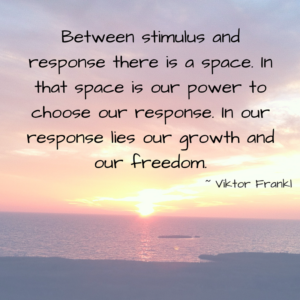
What’s The Impact?
The impact was subtle and snuck up on me. At first it felt like I was playing mind games but I stuck with my plan. At some point, I recognized a sense of more time in my day. The power of the pause, when I realized I was no longer engaged in what I was doing, was huge! The pause allowed me to stop, regroup and move forward with greater awareness. There is a calmness and comfort in me that I did not realize I was missing. With greater awareness and focus, there is greater productivity in my life as well. I am more connected to and engaged with what is happening. I make smarter decisions. Well, maybe not always smarter but more thoughtful and less reactive. It is my super power!
Why Meditate Or Have A Mindfulness Practice?
It’s like lifting weights or practicing a sport. If you want to get stronger or perform a skill better, you do bicep curls, you practice. There are many great resources for activities to incorporate mindfulness into daily living that are like bicep curls for learning to pay more attention to your life. That’s my preferred practice. The MBSR training challenges me to explore a formal seated meditation practice. I do not know what to expect and find myself skeptically curious about possible benefits. At the time of this post, I am half way through the program and once again the impact is subtly sneaking up on me. I can’t decide if it is a sense of calmness or more a lack of frenzy. It is definitely more of an internal shift. My friends probably don’t notice any difference but I am more grounded. It’s a good feeling. Incorporating the essential attitudes of mindfulness into the day is a huge help in the mindfulness struggle.
Seven Essential Attitudes for Mindfulness Practice
The essential attitudes are taken from Kabat-Zinn’s, Full Catastrophe Living and the Duke Integrative Medicine MBSR training workbook with a bit of my personal input.
Non-Judging
Mindfulness is compassionate, open-hearted, choiceless awareness. It is cultivated by becoming an impartial witness to our experiences. This is not easy! Without thinking about it, we look for the value in all we experience. We are conditioned to notice things as good, bad or neutral. Our attention goes to the good and the bad, ignoring the neutral therefore missing out on a good portion of our life.
Non-judging requires that we become aware of the constant stream of judging and reacting to both inner and outer experiences.  The habit of categorizing and judging our experiences locks us into habits or patterns of reacting that we may not even realize. Judging on autopilot causes us to miss moments of our life almost as if we are sleep walking through our day.
The habit of categorizing and judging our experiences locks us into habits or patterns of reacting that we may not even realize. Judging on autopilot causes us to miss moments of our life almost as if we are sleep walking through our day.
When practicing mindfulness, it is important to recognize the judging quality of mind and judgmental thinking as it arises. Whether in your meditation practice or in day-to-day living, become aware of judging. This is boring. I can’t do this. That looks awful. It is equally important not to judge the judging! When you notice the judging is present, congratulate yourself. Noticing the judgement is being aware. It is mindfulness in action!
Oh, and judging is not just negative thoughts. Judgements also include … This is the best. That looks fabulous. She is the smartest.
Notice your next judgement.
Patience
Patience is actually a form of wisdom. It demonstrates that you recognize that things must unfold on their own schedule. During your mindfulness practice, notice impatience with yourself. Notice when the mind is agitated or wandering and losing itself in thinking. Give yourself room to have these experiences. They are part of your life unfolding in this moment. As you begin to notice and observe sensations of impatience in your body, a spaciousness develops around the impatience. Instead of being impatient, you are outside of it, almost as if you are standing beside it. As this happens, you begin to maintain a steadier and stronger connection to the present moment.
Stay present for each step of your journey. Trust each stage. Many things are possible for you if you accept that the fastest way is one step at a time. ~ Melody Beattie, Journey to the Heart: Daily Meditations on the Path to Freeing Your Soul
Beginner’s Mind
All too often, we want to “be in the know” about things, maybe about everything. There is confidence in knowing and not knowing causes vulnerability. We let our thinking and beliefs about what we “know” prevent us from seeing things as they really are. Practicing “beginner’s mind” allows us to experience the world in each moment as if we were meeting it for the first time.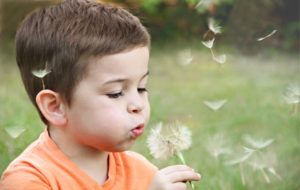
Beginner’s mind is compared to that of a child. Everything is new and experienced as a direct experience without comparison to the past. When practicing mindfulness, we explore with this child like quality, receiving whatever arises as a unique and precious moment with open curiosity.
How often does your thinking and beliefs from past situations cloud your current experience?
Trust
When practicing mindfulness, you are practicing taking responsibility for yourself ~ listening to and trusting yourself. The emphasis is being your own person and understanding what it means to be you. As mindfulness is practiced, awareness of one’s life and experience grows. It is important to be open and receptive to learning from teachers, books and other resources but ultimately this is about you living your life, being the expert of you. We are inundated with information ~ research, social media, websites, etc. Not only is there an abundance of information but it is conflicting information. It is far better to trust yourself and make “mistakes”, than to always look outside yourself for guidance. As you develop trust in yourself and your own basic goodness and wisdom, you will find it easier to trust in others and connect to their goodness. Remember: You are the expert of you!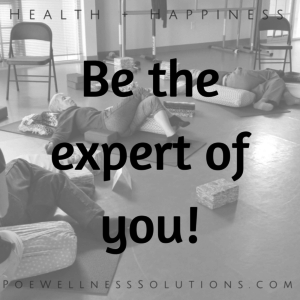
I see this regularly when teaching yoga. Students choose to listen to the instructor more than their own body. This is when injury occurs. Your body is constantly providing you with a wealth of information. Meditation is about honoring that information and your intuition.
Non-Striving
This attitude sounds a little confusing no matter how I explain it. Also it’s my favorite, so hang in there. Oh wow, that was me judging!
Merriam-Webster defines striving as devoting serious effort or energy. We are doers with purpose, striving for accomplishment. Non-striving goes against the way we live. In meditation, the attitude of doing is an obstacle because meditation is non-doing!
With meditation, we don’t strive to become a good meditator, to reduce stress, to lower our blood pressure. Striving is in exact opposition of meditation, non-doing.
In Full Catastrophe Living, Kabat-Zinn explains that clients participating in the stress clinic are asked to identify three goals for attending the program. The client is then encouraged to not make any progress toward their goals but to simply stay present and carefully follow the meditation instructions. He explains that the best way to achieve their goals is to let go of striving for results and instead to focus carefully on seeing and accepting things as they are, moment-by-moment.
Developing mindfulness involves simply paying attention to whatever is happening … letting go and being with what is. If there is a sense of striving or accomplishing, we don’t need to change it, we simply notice!
The reason this is my favorite is because I am a do do doer. It feels good to approach my experiences from a new perspective. It feels good to pay attention to whatever is happening and simply be with what is.
Acceptance
Acceptance is my second favorite attitude of mindfulness. Did you see what I did there? Yes, that was me judging, again.
Acceptance does not mean you like everything or that you take a passive attitude toward life. It does not mean you are satisfied with things as they are, or that you will stop trying to change things. To cultivate acceptance means to find the willingness to see things exactly as they are.
Remember, change occurs in the present moment. The past is gone and the future is later. We have to see things and ourselves as we are if we wish to change, heal, or transform our lives or ourselves. In this context, acceptance means that you come to a willingness to see things as they are, right now.
When were you last surprised or even upset at how something was, as opposed to how you thought it should be?
Letting Go/Letting Be
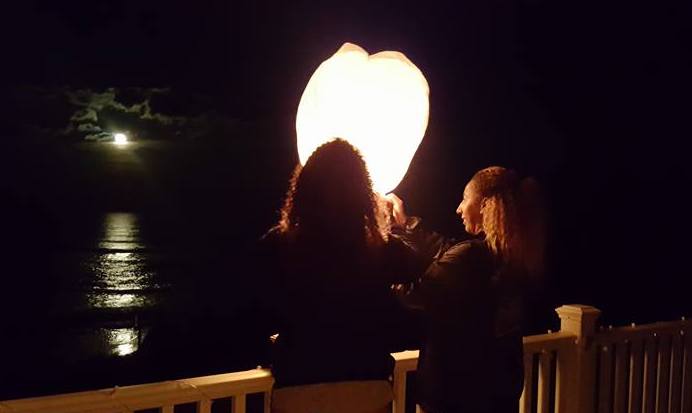 Letting go, means being where you are, being present, without attachment. Often we have the opposite reaction, clinging, unaware of what we are doing. When we begin paying attention to our inner experiences, we realize there are certain thoughts, feelings and situations the mind wants to hold on to. Frequently, what we cling to most strongly are ideas and views about ourselves, others, and situations. The thoughts we hold on to can cause us to escalate or reject our current experience.
Letting go, means being where you are, being present, without attachment. Often we have the opposite reaction, clinging, unaware of what we are doing. When we begin paying attention to our inner experiences, we realize there are certain thoughts, feelings and situations the mind wants to hold on to. Frequently, what we cling to most strongly are ideas and views about ourselves, others, and situations. The thoughts we hold on to can cause us to escalate or reject our current experience.
During meditation, we practice noticing from moment-to-moment ~ grasping, pushing away, judging, thoughts of past or future. We notice and we let them be. We let go. We can also notice the opposite ~ holding on. We can become the experts of our attachments. Whether letting go or holding on, there is much to learn about how we experience the world.
Think to a time when you were faced with a difficult situation. What was your initial response? How did you approach the situation? Often our initial response is to resist, “tighten up” or attempt to change a situation. What if you allowed your mind to take refuge in the breath and let the experience just be, moment-by-moment? Letting go of the clinging will not resolve the current situation but it will allow you the space to see more clearly. The moment, the pause between the situation and your response creates space to give your intelligence a chance.
Why try to start by changing the problem? Why not begin by letting go of your reaction to the problem?
Summing It Up
Creating a mindfulness practice is like establishing any other new habit ~ exercise, eating healthy, drinking more water ~ you have to do it to create the new habit. We all have the ability. There is no right or perfect. Maybe a different form of mediation would suit you better. Loving kindness meditation is my favorite. Find what works for you and the practice will do the work.
Here is a quick summary of how I approach my struggle with mindfulness every day.
- I let go of the struggle!
- Create my own mindfulness definition/program.
- Pay attention to my life.
- Incorporate the seven essential attitudes of mindfulness.
- Notice when distracted from/not paying attention to what I am doing.
- Pause!
- Investigate the distraction.
- Decide where I want to give my attention.
- Return to step 3.
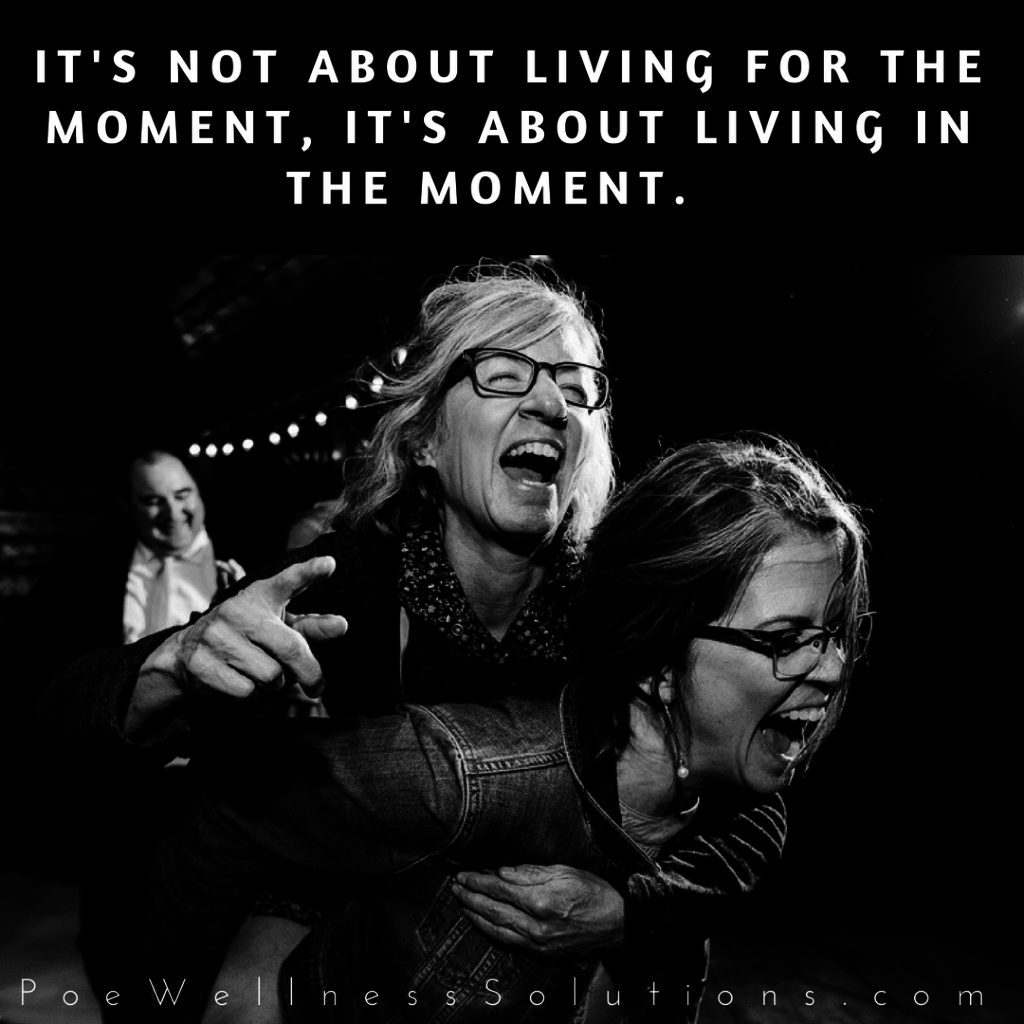
As far as a formal seated mediation practice … it is my new exploration! The seven attitudes of mindfulness overwhelmed me initially. I began by incorporating two of the attitudes into my life. Per my usual way, I tweaked them to better suit my way of thinking. Each morning, I start my day with the a focus of Curiosity/Beginner’s Mind and Compassion/Non-Judging. The other five are falling into place. They are all intertwined and make sense together. Mindfulness is no longer a magical mystery to me but the impact still is. I enjoy the subtle, super powers appearing in my life.
Have fun creating your mindfulness practice. It is not out of your reach. We all have the ability to be present and transform our experience. Enjoy!
Share your thoughts below. Always enjoy hearing from you.

Love this post! Am going to incorporate some of these tips!
Hi Tanyss,
Oh that makes me happy! Hope the tips prove helpful. Enjoy creating your personal mindfulness program. Look forward to enjoying the present moment together.
In Health + Happiness,
meg
… thanks for this morning, we hadn’t fully appreciated, then talked about and agreed, how we missed you!
the above on mindfulness is great (i love the writing, your voice is clear and smart and has your wonderful energy to it) and that photo (that got me here) is so terrifically healthy + happy!
looking forward to our next dinner/get-together with you and Dean (he and i discussed some restaurant possibilities a couple weeks ago) and next class …
also looking forward to yoga blankets at Christmas!
love and best h+h from k+g
hi gregg,
It is always a treat to receive a comment on a post. Comments from you, a professional writer, well, that is a treat plus! Thank you for all your kind words. Mindfulness, classes, dinners, blankets, you + k … It just doesn’t get any better.
In h+h,
meg